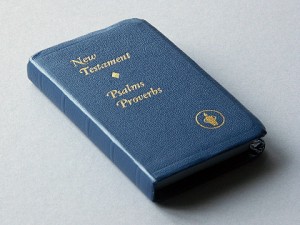Students in Niagara Region won’t be getting those Gideon Bibles so many Canadians remember receiving in class unless their local school board agrees to let atheists distribute their own materials.

That’s the word from the Human Rights Tribunal of Ontario, which ruled on an atheist father’s challenge to the long-standing practice of distributing Gideon Bibles in schools last week in
R.C. v. District School Board of Niagara.
“Allowing only the Gideons, a Christian group, to distribute religious literature in the board’s schools under the version of the policy in place when S.C. was in Grade 5 discriminated against the applicants,” wrote HRTO associate chairman David Wright in his Aug. 13 decision.
“S.C. was a student and R.C. was a parent in a school board where, pursuant to policy, representatives of one creed and no others, including atheists, were permitted to distribute religious texts to students in the schools. They were asked to consent to S.C. receiving the text of one creed with which she did not identify and there was no opportunity for her to receive literature from any other creed that wished to provide it.”
The father, R.C., launched the legal challenge after the principal of his daughter’s school sent home a note in November 2009 that included a permission slip for the Gideons to give her a Bible after class. While the note indicated participation was voluntary, R.C. contacted the principal proposing that he be able to distribute another book, Just Pretend: A Freethought Book for Children, that promotes atheism and, among other things, compares God to Santa Claus.
While the school’s council ultimately decided to distribute neither book, R.C. made a second request to hand out Just Pretend in early 2010. The board declined, arguing schools have the right to sponsor the study of all religions without imposing the view of any particular creed. In its view, according to the ruling, atheism isn’t a religion. In addition, it suggested Just Pretend was a secondary publication as opposed to a globally recognized sacred text.
When it came to whether atheism counts as a creed protected by the Human Rights Code, Wright found in R.C.’s favour.
“In my view, a purposive interpretation of the prohibition on discrimination because of ‘creed’ in the code includes a prohibition on discrimination because a person is atheist,” wrote Wright.
“The difficulty with the respondent’s position is illustrated by the following example of its consequences,” he added. “If an employer decided to dismiss all employees who did not share the religious faith of the president of the company, those who belonged to other religions would have a claim, but not those who are atheist, agnostic or who do not have a view on religion. It would allow the province, a service provider or an employer to enforce particular views and practices on those with atheist views or no clear views about such matters, but not on those who actively believe in a different religion. This is not a purposive interpretation of the code.”
In the end, Wright found that allowing only the Gideons to distribute literature in Niagara schools was discriminatory. While the board has since revised its policy to grant discretion over the distribution of religious materials more generally, Wright found the move to be insufficient, particularly given its restriction to recognized sacred texts.
As such, he struck the board’s current policy and ordered it to revise its approach and “make at least some efforts to encourage a diversity of literature and awareness of the policy under which the materials could be distributed.”
The policy should include allowing for the distribution of atheist materials, a prospect Wright admitted could be controversial.
I understand that some parents and students may not agree with some of the content of atheist literature like Just Pretend. However, the applicant and others do not agree with some of the content of the Gideon Bible. If the board decides to have a policy permitting distribution of religious literature, it must be prepared to accept that some parents and students might object to materials that others, with parental permission, are receiving. If it is prepared to distribute permission forms proposing the distribution of Christian texts to committed atheists, it must also be prepared to distribute permission forms proposing the distribution of atheist texts to religious Christians. It cannot design its criteria in a way that would permit communication of materials setting out their beliefs by some, but not all creeds.
For its part, the board says it respects the tribunal’s decision.
“Our locally elected trustees are responsible for determining board policy and we will forward the information contained in the order to them for their review and consideration,” says District School Board of Niagara spokesman Brett Sweeney.
“The tribunal’s decision provides for two possible courses of action and our trustees will collaborate with each other, engage with parents, and consider the best interests of the students we serve to determine the best way to move forward.”

 That’s the word from the Human Rights Tribunal of Ontario, which ruled on an atheist father’s challenge to the long-standing practice of distributing Gideon Bibles in schools last week in R.C. v. District School Board of Niagara.
That’s the word from the Human Rights Tribunal of Ontario, which ruled on an atheist father’s challenge to the long-standing practice of distributing Gideon Bibles in schools last week in R.C. v. District School Board of Niagara.